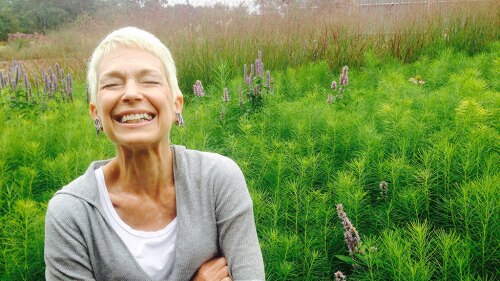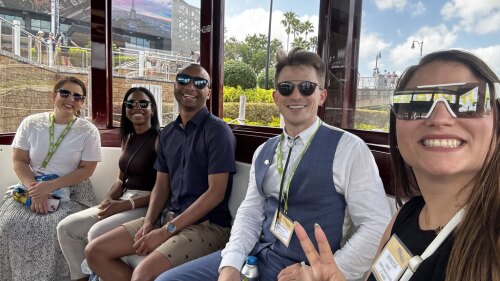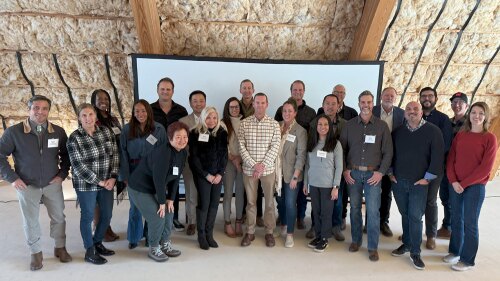In the closing address at the 2018 ULI Fall Meeting in Boston, social psychologist and best-selling author Amy Cuddy urged audience members to alter their physical posture, speak more slowly, and use expansive breathing to feel more powerful and open to communicating with others.
Research has shown that the body provides feedback to the nervous system and brain, so that standing or sitting in a way that expands the body actually influences our mood and promotes a more optimistic view and creativity, Cuddy explained.
Cuddy, an associate professor in the Negotiation, Organizations, and Markets Unit at Harvard Business School, is the author of the 2015 bestseller, Presence: Bringing Your Boldest Self to Your Biggest Challenges. She became an internet sensation after giving a 2012 TED Talk, “Your Body Language May Shape Who You Are,” which has been viewed more than 49 million times.
Cuddy said that power is about confidence, rather than arrogance or aggression. A confident person is better able to express what she calls the “authentic self,” and in turn makes others feel more comfortable about trusting and expressing themselves.
Social psychologist, Harvard Professor, and TED Talker Amy Cuddy shares how to become more present, influential, compassionate, and satisfied in both professional and personal lives during the Closing General Session. Follow all #ULIFall coverage at https://t.co/8eNbr3dZC9 pic.twitter.com/UkgAsfvllM— Urban Land Institute (@UrbanLandInst) October 11, 2018
Cuddy recommended that listeners put aside fears of being inadequate to the task—“imposter syndrome”—by concentrating on developing presence, the sense of being attuned to one’s feelings and able to connect with others, rather than becoming fixated on a potentially negative outcome and its consequences.
People can influence themselves and feel more powerful in meetings and interviews by adopting physical poses—such as standing in a Superman-like stance, leaning over a table, or sitting in a relaxed position in a chair.
“Nobody can be present all the time, but when we are, we’re attuned to and capable of expressing our best selves,” she said.
Cuddy showed images of athletes demonstrating what may be the ultimate power pose—standing chest out and lifting one’s arms overhead. She said that research has shown that the pose is found throughout human societies, and even is performed by people who have been blind from birth.
Cuddy suggested building habits into your day to practice expanding the body, such as putting objects on high shelves so that you have to stretch to reach them.
Expansiveness and power poses extend to how a person speaks as well, she said. In experiments, subjects who were instructed to read texts aloud more slowly than usual tended to feel more powerful, and listeners observed that the speakers seemed more powerful as well.
Pauses are “a powerful way to say, I’m not afraid to be here,” Cuddy explains.
ULI Global Governing Trustees met with best-selling author Amy Cuddy, where she shared her insights on how to leverage ourselves as our best asset. See more from #ULIFall at https://t.co/8eNbr3dZC9 pic.twitter.com/Klax9R1Wc5— Urban Land Institute (@UrbanLandInst) October 12, 2018
Conversely, people who lower their heads, hunch their shoulders, or slump in their seats are reinforcing their feelings of powerlessness, she said. Speaking rapidly without pausing has a similar effect.
Power and presence are not about being unfiltered and saying whatever crosses one’s mind, Cuddy said. “Think of the best moments in your life, and those were probably moments when you were your authentic self,” she said. “That’s the same person you want to bring into these situations.”
Cuddy said that research shows that people who succeed in one-off situations that require making a sale—whether they’re selling a product, pitching to potential investors, or applying for a new job—have three predictors. “First is that we believe our story, that we buy what we’re selling,” she said. In addition, they project confidence so that that they are comfortable even when challenged by others. Finally, their words and nonverbal behavior are in sync.
That last point is crucial, Cuddy said, because a person telling a falsehood will have different underlying emotions than the ones that would be associated with what they are saying. Their nonverbal behavior tends to “leak” their true emotions, which communicates to listeners that they are not to be trusted.
Cuddy said she suspected that many people in the real estate industry probably are more confident than average, but nevertheless could benefit from her insights when they find themselves in difficult negotiations.
Cuddy also recounted her own difficult personal journey. After suffering a traumatic brain injury in a car accident in college, she had difficulty recovering and needed several additional years to finish college. As a graduate student attending a professional conference, she carefully rehearsed her “elevator pitch”—a quick presentation designed to sell her to potential employers.
Then, through a curious twist of bad luck, she actually found herself in an elevator with several potential employers, one of whom abruptly challenged her to give her pitch. She panicked and gave a hurried, disjointed presentation, which she knew was so bad that she began thinking she might make a career change and become an organic farmer in Vermont. At the end, one of her potential employers told her it was the worst elevator pitch he ever had heard.
Nevertheless, “I survived the worst outcome,” Cuddy said, and eventually became both a professor at a top institution and a best-selling author.





